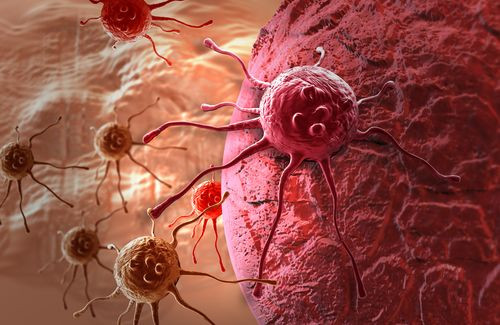Cancer Cells Thrive Most When Starved For Oxygen: New Findings Could Improve Cancer Treatment Strategies

In oxygen-depleted areas of a tumor, cancer cells should simply die off, but too often they not only continue to survive, they actually thrive. A new study that has explored this puzzling ability demonstrates how cancer cells divert and use glutamine, the most common amino acid, to supply their own needs during times when oxygen levels dip below normal. The researchers believe their discovery of this molecular pathway might offer insight to researchers hoping to find new ways to inhibit tumor growth. "These results are particularly exciting because glutamine metabolism is a potential target for anticancer therapy," said principal investigator, Dr. Nicholas Denko, associate professor of radiation oncology at Ohio State University. Their research appears in Cell Metabolism.
Blocking the Path
"Tumor cells require glutamine to grow, so groups have been trying to identify drugs that block glutamine metabolism and inhibit tumor growth,” Denko stated in a press release. “However, drugs that completely block glutamine metabolism will have unwanted side effects because glutamine is also an important neurotransmitter." To begin a new study in this area of research, Denko and co-author Ramon C. Sun, a postdoctoral scientist researching radiation oncology, began with their knowledge of cell metabolism and hypoxia, a condition of low-oxygen.
Under normal oxygen levels, healthy cells use glutamine largely to produce energy, with a small amount diverted to make fatty acids and lipids. But when oxygen levels drop in areas of a growing tumor, the hypoxic conditions activate a protein called HIF1, and it is this which forges a new pathway that shifts the use of glutamine away from healthy energy production toward the synthesis of lipids needed for cell proliferation.
Looking at these reactions more closely, the team of researchers discovered that activation of HIF1 leads to the breakdown of an enzyme called OGDH2, which in turn is necessary whenever glutamine helps produce energy via the tricarboxylic acid cycle, commonly referred to as the Krebs cycle. (The Krebs cycle is a series of chemical reactions used by all aerobic, or oxygen-dependent, organisms to generate energy.) The researchers discovered it is when OGDH2 is lost in this manner that the malignant cells are able to divert glutamine from its usual healthy use to unhealthy proliferation. Turning to an animal model, the researchers began experiments whereby they forced cancer cells to express a hypoxia-resistant form of OGDH2. What happened next? The tumors grew significantly slower when cancer cells expressed the hypoxia-resistant OGDH2.
"We show that we can block the growth of model tumors by redirecting hypoxic glutamine metabolism to make it follow the normal-oxygen pathway,” Denko stated. “Such a therapeutic strategy should have few-if-any unwanted side effects, because normal tissue is oxygenated and already using glutamine in the normal manner."
Source: Denko NC, Sun RC. Hypoxic Regulation of Glutamine Metabolism through HIF1 and SIAH2 Supports Lipid Synthesis that Is Necessary for Tumor Growth. Cell Metabolism. 2014.
Published by Medicaldaily.com



























